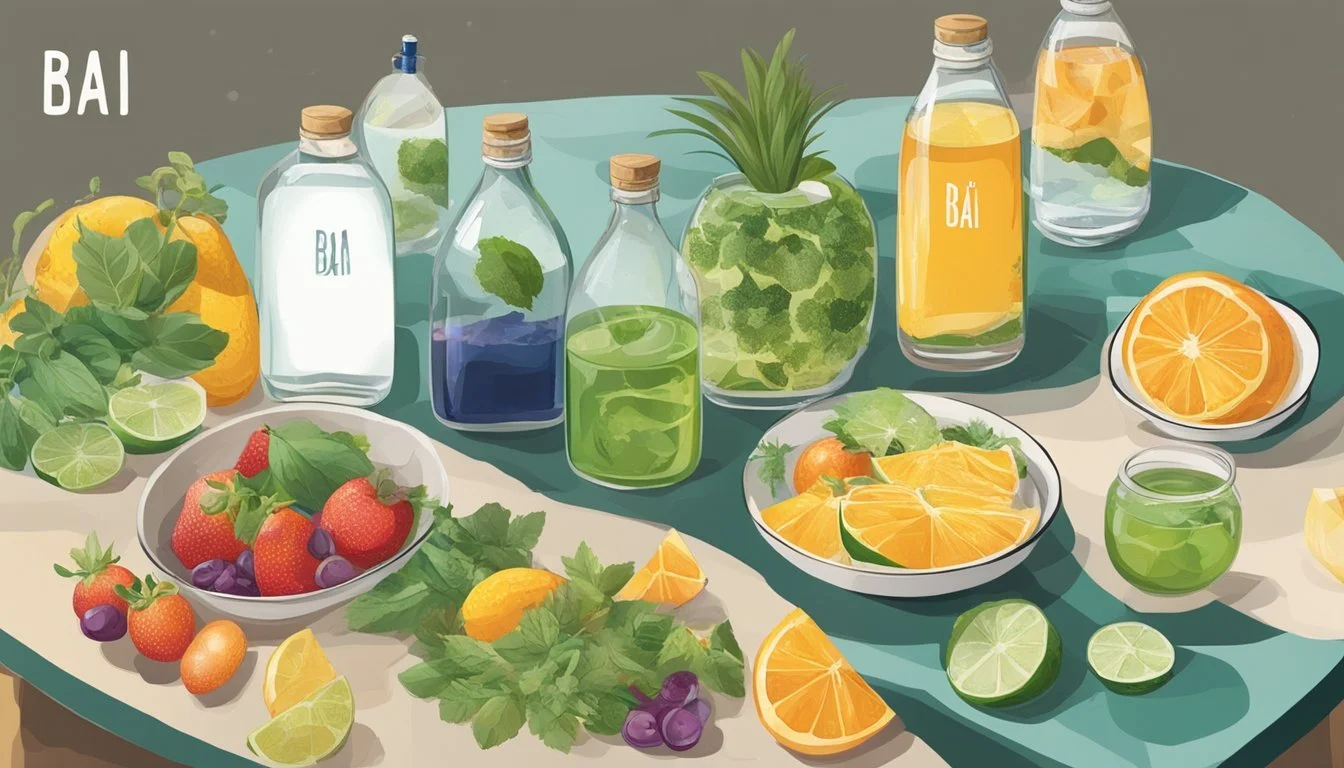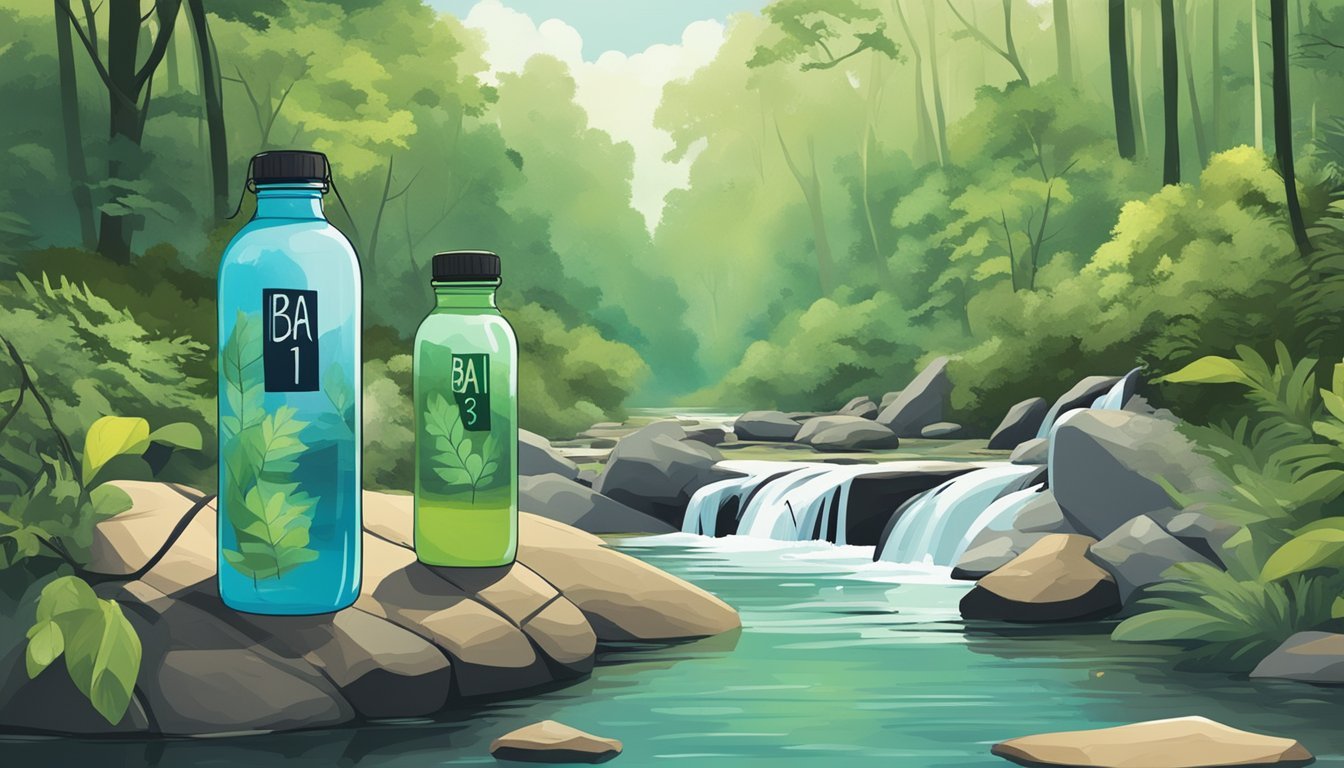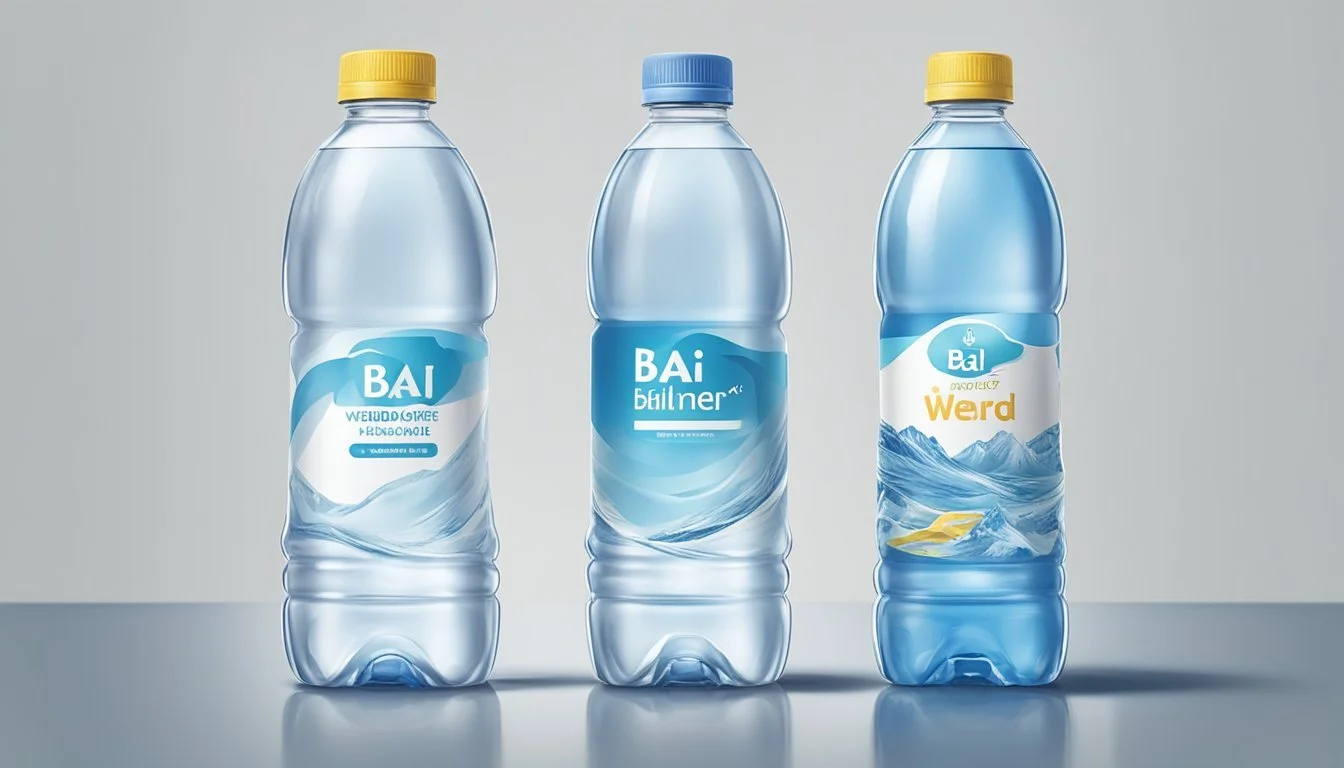Bai vs. Weird Water
An Objective Comparison
When choosing bottled water, consumers often face a myriad of options, each claiming unique benefits. Bai and Weird Water are two brands that have garnered attention for their distinctive offerings. For health-conscious consumers, Bai’s antioxidant-infused beverages boast added vitamins and low-calorie content, making it a compelling choice over traditional bottled water.
Weird Water, on the other hand, focuses on purity without added ingredients, appealing to those seeking a straightforward hydration solution. Bai's use of coffee fruit extract and natural flavorings sets it apart in terms of taste and nutritional profile. Meanwhile, Weird Water emphasizes a clean, unaltered drinking experience with no added sugars or calories.
Both brands have their merits, depending on what the consumer values most. Whether you're drawn to Bai's nutritious additives or Weird Water's pure simplicity, the decision ultimately hinges on personal preference and lifestyle needs.
The Brand Stories
Bai and Weird Water both have unique origins and ownership backgrounds, as well as distinct product ranges and offerings, which contribute to their market presence and consumer appeal.
Origins and Ownership
Bai was founded in 2009 by Ben Weiss. The brand quickly gained attention for its innovative approach to bottled water, incorporating antioxidant infusions from coffee fruit and tea extracts. In 2016, Bai was acquired by Dr Pepper Snapple Group, which later became part of Keurig Dr Pepper, a move that significantly expanded its distribution and visibility.
Weird Water's origins are more obscure, often marketed as a niche, quirky brand targeting a specific audience looking for unconventional and eco-friendly products. While details on its exact founding are less available, it is known to operate independently, potentially giving it more flexibility in product development and market strategies.
Product Range and Offerings
Bai offers a wide range of flavored waters infused with antioxidants, catering to health-conscious consumers. Popular flavors include Brasilia Blueberry, Panama Peach, and Costa Rica Clementine. Each bottle is typically low in calories and free from artificial sweeteners, making it a preferred choice for those mindful of their diet.
Weird Water, on the other hand, focuses on unique, often limited edition products that emphasize sustainable packaging and eco-friendly messages. Their offerings might include flavored waters as well, but the brand differentiates itself with unexpected and unconventional options that appeal to adventurous consumers seeking novelty in their hydration choices.
The combination of Bai's health-focused infusions and Weird Water's eco-centric innovation provides consumers with diverse bottled water options, each with a distinct appeal based on their origins and product ranges.
Nutritional Analysis
The nutritional comparison of Bai and Weird Water reveals differences in caloric content, sweeteners, antioxidant levels, and vitamins and minerals. This section details these crucial aspects to help determine which bottled water option may be more beneficial.
Caloric Content and Sweeteners
Bai beverages contain 10 calories per bottle and use erythritol and stevia as natural sweeteners.
These sweeteners provide a low-calorie option without the use of artificial sweeteners. Erythritol, a sugar alcohol, is known for having minimal impact on blood sugar levels. Stevia, a plant-based sweetener, is favored for its zero-calorie content.
In contrast, Weird Water contains no calories and does not include any sweeteners. This makes it a pure water option with no additional ingredients impacting caloric intake or taste. Consumers seeking a truly zero-calorie beverage might prefer Weird Water.
Antioxidant Levels and Health Claims
Bai stands out for its inclusion of antioxidants derived from coffee fruit extract and tea extract. These antioxidants are known to combat oxidative stress, which can protect cells from damage. Studies have suggested potential health benefits, such as improved cognitive function from watermelon juice, a component in some Bai flavors.
Weird Water does not contain antioxidants. This limits any health claims related to antioxidant benefits. For those looking to boost their antioxidant intake through their beverage choices, Bai offers a significant advantage over Weird Water.
Vitamin and Mineral Content
Bai beverages feature vitamin C and other nutrients. Vitamin C contributes to immune system support and skin health. While not all Bai flavors contain additional vitamins and minerals, the inclusion of these nutrients might appeal to health-conscious consumers.
In contrast, Weird Water is typically just plain water without added vitamins or minerals. This makes it a simpler, more basic hydration choice. Consumers who prioritize additional vitamins and minerals in their hydration routine might find Bai a more compelling option.
Both Bai and Weird Water cater to different preferences and dietary needs. Understanding the nutritional makeup can help consumers make an informed choice based on their individual health goals.
Flavor Profiles and Ingredients
When comparing Bai and Weird Water, it's essential to consider the flavor profiles and ingredient lists. These aspects directly impact how consumers perceive taste, nutrition, and the overall drinking experience.
Natural vs. Artificial Flavors
Bai emphasizes using natural flavors and antioxidant-rich ingredients in its products. They primarily use fruit flavors derived from coffee fruit extract, resulting in distinct tastes like cherry and blueberry. This focus on natural ingredients appeals to consumers looking for more authentic flavor experiences.
Weird Water, on the other hand, often includes artificial flavors to achieve their diverse taste profiles. The use of artificial ingredients can sometimes lead to a more vibrant but less natural tasting product. Those who prioritize a clean label may prefer Bai for its commitment to natural flavors.
The Role of Sweetness in Flavor
Bai products are known for their low-calorie count, achieved by minimal sugar content and the use of natural sweeteners. With just 1 gram of sugar per bottle, the sweetness is subtle. This caters to health-conscious consumers seeking beverages that don't rely on excessive sugar.
Weird Water varies in its approach to sweetness. Some variants might use artificial sweeteners to enhance the taste without adding calories. Others might contain more natural sweeteners but with a higher sugar content. The choice between Bai and Weird Water ultimately depends on how important low sugar content is to the consumer.
Unique Ingredient Additions
Bai sets itself apart with the inclusion of coffee fruit extract, which provides antioxidants in addition to flavor. These unique ingredients make Bai more than just a hydration source; it’s also a way to boost one’s intake of beneficial compounds. Flavors like watermelon and blueberry are not just unique but also fortified with vitamins.
Weird Water may introduce unexpected flavor combinations through both artificial and natural means. The focus here is often on creating novel taste experiences. This appeals to those interested in trying new and innovative flavors. However, it may not always align with the preferences of consumers looking for naturally derived ingredients.
Environmental and Sustainability Considerations
When comparing Bai and Weird Water, understanding their environmental and sustainability practices is crucial. Key considerations include how much plastic they use in their packaging and how sustainably they source their water.
Bottles and Plastic Use
Bai uses PET plastic for their bottles, which can be recycled. They emphasize the minimal use of plastic while ensuring durability. Their focus on recycling programs aims to reduce their environmental impact.
Weird Water, on the other hand, opts for an innovative approach with biodegradable plastic bottles. These bottles break down faster than traditional plastic, potentially offering a more environmentally friendly solution.
Both brands claim to prioritize sustainability, but the effectiveness of their approaches can vary based on recycling and degradation practices in different regions. Consumers may consider the type of plastic used and the brand's commitment to reducing plastic waste when choosing between these two options.
Water Source and Extraction
Bai sources their water and incorporates coffee fruit extract and tea extract, both known for their antioxidant properties. Their use of locally sourced ingredients highlights a commitment to supporting regional agriculture and reducing carbon footprints associated with long-distance transportation.
Weird Water promotes its water as natural spring water, sourced directly from pristine springs. The sourcing practices focus on maintaining the purity and natural integrity of the water. They employ sustainable extraction methods to ensure minimal disruption to the environment and preserve the natural aquatic ecosystems.
Both Bai and Weird Water emphasize sustainable sourcing practices, but they cater to different consumer preferences for flavored vs. natural water. The choice may come down to a preference for additional ingredients or the desire for spring water sourced through environmentally conscious methods.
Health and Hydration
Both Bai and Weird Water offer unique characteristics that cater to health-conscious consumers seeking hydration solutions. This section explores how these brands address hydration needs, the role of electrolytes, and considerations for consumer health awareness.
Drinking Water for Hydration
Staying hydrated is crucial for maintaining bodily functions and overall health. Bai provides an enjoyable option with its fruit-infused waters, making it easier for people to consume more water. Weird Water focuses on purity, ensuring that its product contains only essential elements without any additives.
Proper hydration aids in digestion, circulation, and temperature regulation. Both brands aim to enhance the consumer's hydration experience by offering different yet effective methods.
Electrolytes and Hydration Benefits
Electrolytes play a key role in maintaining fluid balance in the body. Bai infuses its waters with antioxidants from coffee fruit extract, but it does not specifically market its products for electrolyte content. This makes Bai a flavorful choice, rich in nutrients, but not necessarily aimed at those needing electrolyte replenishment.
Weird Water, on the other hand, may focus more on electrolyte balance, providing plain yet functional hydration. This makes it suitable for activities that induce sweating, ensuring that the body retains necessary minerals.
Consumer Health Awareness
Health-conscious consumers are increasingly aware of what they consume. Bai appeals to this demographic with drinks that are low in sugar and calories, free from artificial sweeteners, gluten, and packed with natural antioxidants. Such features align well with those seeking to avoid unnecessary additives.
Weird Water prides itself on simplicity and purity, reducing potential health risks associated with plastic chemicals by often using alternative packaging. This resonates with consumers who prioritize both health and environmental stewardship.
By addressing different aspects of health and hydration, both Bai and Weird Water meet diverse consumer needs effectively.
Product Comparison
In this section, we evaluate Bai and Weird Water on three critical dimensions: flavor options, health benefits, and price and value. This will help readers determine which brand suits their needs best.
Comparison of Flavor Options
Bai Water offers flavored options that include natural fruit essences, catering to those looking for an alternative to plain water. These flavors are sweetened with low-calorie sweeteners like erythritol and stevia.
Weird Water, on the other hand, is known for its minimalistic approach, offering both still and sparkling variants without added flavors. This appeals to consumers preferring the taste of pure water.
Here's a brief comparison:
Brand Flavor Options Sweeteners Bai Fruit flavors Erythritol, Stevia Weird Water Still, Sparkling None
Health Comparison
Health-wise, Bai Water contains antioxidants derived from coffee fruit extract and tea extract. These antioxidants can support overall well-being. Bai’s beverages are also low in calories and do not contain artificial sweeteners or added sugars. Each bottle has only 1 gram of sugar and is gluten-free.
Weird Water typically offers purified water, sometimes sourced from springs and purified through reverse osmosis. It contains no additives, making it a suitable choice for those wanting pure hydration without any additional ingredients.
Both brands have unique health benefits.
Brand Health Benefits Bai Antioxidants, low-calorie, gluten-free Weird Water Purified, no additives
Price and Value
Bai Water tends to be priced higher due to its added flavors and antioxidants. Consumers may find value in the unique taste and health benefits despite the higher cost.
Weird Water typically comes at a lower price point, offering high-quality hydration without additional costs associated with flavoring and additives.
Below is a basic comparison of pricing factors:
Brand Price Range Added Value Bai Higher Flavors, antioxidants, low-calorie Weird Water Lower Pure, straightforward hydration
This comparison sheds light on the distinct qualities of each brand, guiding consumers to make a well-informed choice based on their preferences and needs.
Final Considerations and Best Practices
When deciding between Bai and Weird Water, it’s essential to consider taste preferences, health benefits, and the environmental impact of each option to make an informed decision that suits your needs.
Balancing Taste Preferences and Health
Bai offers flavored water with added antioxidants, vitamins, and alkaline minerals, aiming to enhance both taste and nutritional value.
Weird Water, assuming it provides a distinct taste profile, might appeal to those who prefer unflavored, pure hydration.
When balancing taste and health, consider the 1g of sugar and 10 calories in Bai against the purer profile of Weird Water. Assess individual health goals, taste preferences, and daily dietary needs before making a choice.
Choosing Environmentally Sustainable Options
Sustainability is a growing concern for consumers. Bai promotes its antioxidant benefits but has not been widely scrutinized for sourcing practices.
Investigate Weird Water's commitment to environmental stewardship, packaging, and production processes.
Opt for brands utilizing recyclable materials and sustainable practices. Look for certifications or membership in organizations like the International Bottled Water Association (IBWA) that advocate for responsible water usage and environmental consciousness.
Recommendations for Informed Choices
To make an informed choice, verify the source of the water and nutritional content.
Review consumer feedback on taste, health benefits, and environmental impact.
Balancing personal health needs with environmental considerations is crucial. Choosing a product that aligns with both personal values and nutritional requirements ensures smarter, more sustainable hydration choices.
Conclusion
Bai and Weird Water each present unique features that cater to different consumer preferences.
Bai offers a variety of flavored water options, incorporating antioxidants from coffee fruit and tea extracts. This makes it an appealing choice for those looking not only for hydration but also for added nutritional benefits.
Weird Water distinguishes itself with its minimalist ingredient list and eco-friendly packaging. It focuses solely on providing pure, clean water without additional flavors or additives, which can be ideal for purists and environmental enthusiasts.
Feature Bai Weird Water Flavors Multiple flavors available Pure water only Added Benefits Antioxidants included None Packaging Standard bottles Eco-friendly Target Audience Health-conscious and taste seekers Minimalists and eco-conscious individuals
In terms of cost, both brands are positioned within the premium segment, though Bai's flavored variations may make its price point feel more justified for those seeking a richer taste experience.
The decision between Bai and Weird Water depends heavily on individual priorities. Those interested in flavors and additional health benefits might prefer Bai. On the other hand, those valuing simplicity and environmental sustainability may lean towards Weird Water.
Both brands fulfill their unique promise to consumers, whether it’s a nutrient boost or a cleaner planet.






